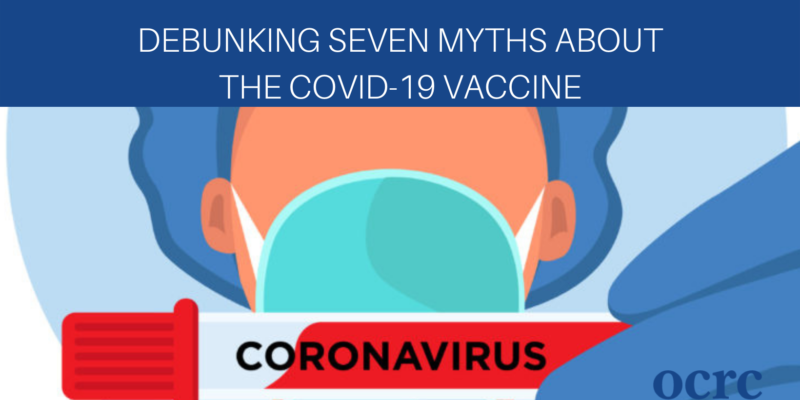
August is National Immunization Awareness Month, a time to spread awareness about the importance of vaccines to protect against serious diseases. With nearly a year and a half of the COVID-19 pandemic behind us and the recent emergence of the Delta variant, there’s no better time to hold informed conversations with loved ones about the importance of the COVID-19 vaccine.
That being said, there is a lot of misinformation surrounding the life-saving vaccine. Accurate information is critical when making any decisions about your health, and the vaccine is no exception. Read on as we debunk seven myths surrounding the COVID-19 vaccine.
Fact: Because the vaccine does not contain any live virus, it is impossible to contract COVID-19 as a result of getting vaccinated.
Typically, vaccinations—such as the flu shot—consist of weakened, inactivated samples of the disease-causing germ in question. This causes the immune system to recognize and fight off the virus.
The COVID-19 vaccine, on the other hand, is different. It is an mRNA vaccine, (or messenger RNA vaccine), which “teaches” our cells to produce a protein which triggers the necessary immune response.
Fact: Although the development process was expedited, the COVID-19 vaccine still went through every step required to meet all safety standards and become FDA-approved.
The development of a vaccine is a complex process which typically takes between 10-15 years. However, given the severity of the COVID-19 pandemic, we simply could not afford to wait that long for a solution.
Diligent research, worldwide collaboration, rigorous clinical trials, and an abundance of clinical study volunteers all contributed to the rapid development of this safe, effective vaccine.
Fact: There has been no scientifically plausible evidence linking the COVID-19 vaccine and infertility or miscarriage.
Misinformation circulating online states that the vaccine trains the body to attack a protein in the placenta. Some claim this leads to infertility among women. While there is an amino acid sequence between the spike protein and placental protein, it’s too brief to trigger an immune response which would have any effect on fertility in males or females.
Fact: Vaccine side effects are generally brief, and the vaccine will not alter your DNA.
Some people experience arm soreness, muscle aches, fatigue, and fevers following their vaccination appointment. At their worst, these side effects can last for a few days.
Additionally, the mRNA from the vaccine will never interact with the DNA. After it’s done “reading the instructions,” in order to create the spike protein found on the coronavirus, the body removes the mRNA.
The COVID-19 vaccine also does not contain any tracking devices or metals which would cause magnetism.
Fact: There is no guarantee that getting diagnosed with COVID-19 once will prevent you from getting sick again.
While contraction of some viruses (such as chickenpox) leads to immunity, each person’s natural immunity varies. At this time, experts are unsure how long someone who was previously diagnosed with COVID-19 is protected from contracting the virus again—or to what extent they are protected in the first place.
In order to best protect yourself and your loved ones, opt for the vaccine whether or not you have already had COVID-19.
Fact: Everyone over the age of 12 can benefit from getting vaccinated.
The elderly and those with underlying health conditions are at a greater risk of contracting COVID-19. However, younger, healthier people can still contract the virus; they could even be asymptomatic and spread it to others without knowing.
Widespread vaccination is crucial when it comes to putting a stop to the global pandemic.
Fact: Until enough people are vaccinated, it’s best to continue wearing masks and practicing social distancing.
The vaccine may keep you from getting sick altogether. Researchers are still exploring whether and to what extent a vaccinated person can carry and transmit the virus.
Simply put, it’s better to be safe than sorry. This is especially important as we aim to protect ourselves and our communities from dangerous new COVID-19 variants.
When obtaining information from family, friends, or the internet, it’s important to be aware of the source’s credibility. When it comes to the COVID-19 vaccine, it’s best to seek information from credible sources including Centers for Disease Control and Prevention, the World Health Organization, the National Network for Immunization Information, and trusted healthcare professionals.
